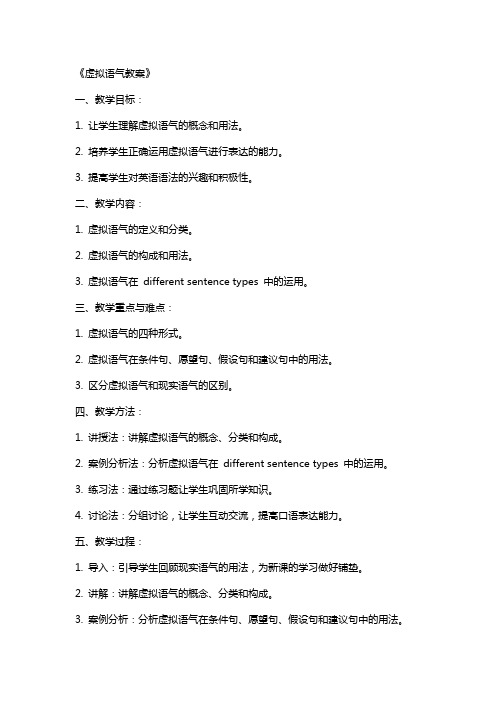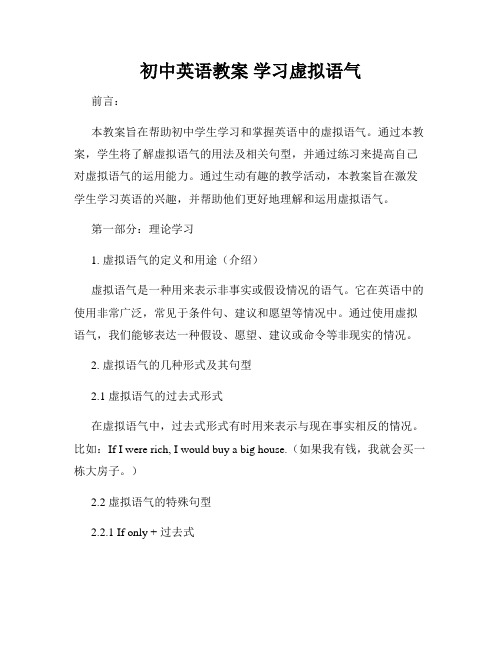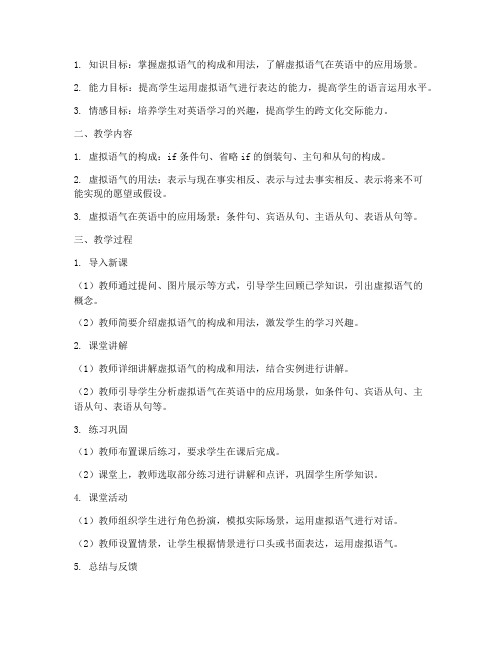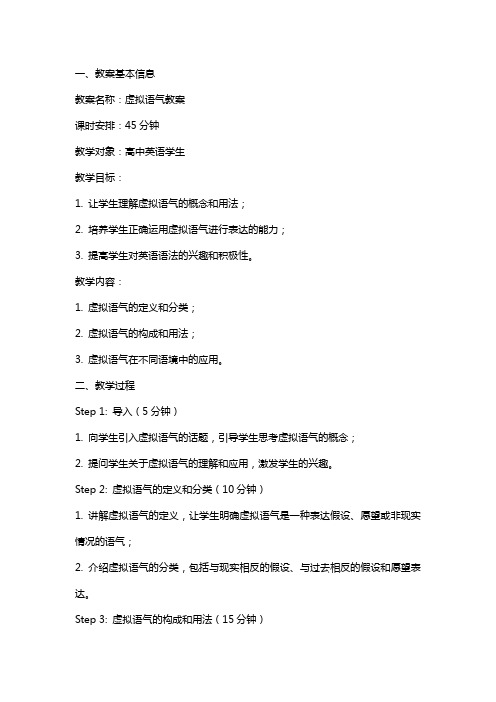虚拟语气教案
《虚拟语气教案》

《虚拟语气教案》一、教学目标:1. 让学生理解虚拟语气的概念和用法。
2. 培养学生正确运用虚拟语气进行表达的能力。
3. 提高学生对英语语法的兴趣和积极性。
二、教学内容:1. 虚拟语气的定义和分类。
2. 虚拟语气的构成和用法。
3. 虚拟语气在different sentence types 中的运用。
三、教学重点与难点:1. 虚拟语气的四种形式。
2. 虚拟语气在条件句、愿望句、假设句和建议句中的用法。
3. 区分虚拟语气和现实语气的区别。
四、教学方法:1. 讲授法:讲解虚拟语气的概念、分类和构成。
2. 案例分析法:分析虚拟语气在different sentence types 中的运用。
3. 练习法:通过练习题让学生巩固所学知识。
4. 讨论法:分组讨论,让学生互动交流,提高口语表达能力。
五、教学过程:1. 导入:引导学生回顾现实语气的用法,为新课的学习做好铺垫。
2. 讲解:讲解虚拟语气的概念、分类和构成。
3. 案例分析:分析虚拟语气在条件句、愿望句、假设句和建议句中的用法。
4. 练习:布置练习题,让学生巩固所学知识。
5. 讨论:分组讨论,让学生互动交流,提高口语表达能力。
7. 作业布置:布置课后作业,巩固所学知识。
六、教学评价:1. 课后作业:评估学生对虚拟语气的理解和运用能力。
2. 课堂练习:观察学生在练习中的表现,及时发现问题并进行针对性的辅导。
3. 小组讨论:评价学生在讨论中的参与程度和口语表达能力。
4. 考试:设置有关虚拟语气的试题,检验学生对知识的掌握程度。
七、教学资源:1. 教材:选用合适的英语教材,如《新概念英语》、《大学英语》等。
2. 教案:根据教材内容编写详细的教学计划。
3. 课件:制作课件,辅助讲解和展示虚拟语气的用法。
4. 练习题:编写练习题,巩固学生对虚拟语气的掌握。
八、教学进度安排:1. 第一课时:介绍虚拟语气的概念和分类。
2. 第二课时:讲解虚拟语气的构成和用法。
3. 第三课时:分析虚拟语气在条件句、愿望句、假设句和建议句中的用法。
初中英语教案 学习虚拟语气

初中英语教案学习虚拟语气前言:本教案旨在帮助初中学生学习和掌握英语中的虚拟语气。
通过本教案,学生将了解虚拟语气的用法及相关句型,并通过练习来提高自己对虚拟语气的运用能力。
通过生动有趣的教学活动,本教案旨在激发学生学习英语的兴趣,并帮助他们更好地理解和运用虚拟语气。
第一部分:理论学习1. 虚拟语气的定义和用途(介绍)虚拟语气是一种用来表示非事实或假设情况的语气。
它在英语中的使用非常广泛,常见于条件句、建议和愿望等情况中。
通过使用虚拟语气,我们能够表达一种假设、愿望、建议或命令等非现实的情况。
2. 虚拟语气的几种形式及其句型2.1 虚拟语气的过去式形式在虚拟语气中,过去式形式有时用来表示与现在事实相反的情况。
比如:If I were rich, I would buy a big house.(如果我有钱,我就会买一栋大房子。
)2.2 虚拟语气的特殊句型2.2.1 If only + 过去式If only + 过去式可以用来表示对现在或过去不可能实现的愿望。
比如:If only I were taller!(要是我个子高点就好了!)2.2.2 Would rather + 过去式Would rather + 过去式用来表示对现在或将来情况的偏好。
比如:I would rather you came tomorrow.(我宁愿你明天来。
)2.2.3 It's time + 过去式It's time + 过去式用来表示现在理应发生但尚未发生的事情。
比如:It's time you finished your homework.(你该完成作业了。
)第二部分:教学实践3. 学习虚拟语气的游戏活动3.1 过去式拼图游戏让学生分成小组进行游戏,每组将一张卡片上缺少过去式的动词补充完整。
比如:If I ________ (be) a bird, I would fly in the sky.(如果我是一只鸟,我会在天空中飞翔。
虚拟语气教学案

虚拟语气教学案一、教学目标:1. 理解虚拟语气的基本概念和用法;2. 掌握虚拟语气的各种形式和常用句型;3. 能够运用虚拟语气正确地表达假设、愿望、建议等意思。
二、教学内容:1. 虚拟语气的基本概念:虚拟语气是一种用来表达非事实的语气,在句子中表达假设、愿望、建议等意义。
它通常以“过去的事实”“未来的情况”“假设的事实”为前提,常常与情态动词、动词过去式、were 等连用。
2. 虚拟语气的用法:2.1. 表达假设:2.1.1. 虚拟语气在条件句中的用法- 表示与现实相反的假设条件,使用虚拟语气。
如:If I were you, I would study harder.2.1.2. 虚拟语气在宾语从句中的用法- 表示与现实相反的假设、推测、建议等,使用虚拟语气。
如:I suggest that she stay at home.2.2. 表达愿望:2.2.1. 表达与现实相反的愿望,使用虚拟语气。
如:I wish I were taller.2.2.2. 表达对过去事实的遗憾,使用虚拟语气。
如:I wish I had studied harder.2.3. 表达建议:2.3.1. 表达对现在或将来的建议,使用虚拟语气。
如:I suggest that he take a break.2.4. 虚拟语气在宾语从句中的用法- 表示与现实相反的假设、推测、建议等,使用虚拟语气。
如:I suggest that she stay at home.三、教学过程:3.1. 引入虚拟语气的概念,解释其基本用法和用例。
3.2. 分析和讨论虚拟语气在不同语境中的应用。
3.3. 练习虚拟语气的基本句式和用法。
3.4. 组织学生进行虚拟语气的口语练习,巩固所学内容。
3.5. 提供虚拟语气相关练习的练习题,并进行讲解和解答。
3.6. 作业要求学生写一篇虚拟语气的短文,包含各种虚拟语气形式,以检验学生对虚拟语气的掌握程度。
虚拟语气教学设计方案

1. 知识目标:掌握虚拟语气的构成和用法,了解虚拟语气在英语中的应用场景。
2. 能力目标:提高学生运用虚拟语气进行表达的能力,提高学生的语言运用水平。
3. 情感目标:培养学生对英语学习的兴趣,提高学生的跨文化交际能力。
二、教学内容1. 虚拟语气的构成:if条件句、省略if的倒装句、主句和从句的构成。
2. 虚拟语气的用法:表示与现在事实相反、表示与过去事实相反、表示将来不可能实现的愿望或假设。
3. 虚拟语气在英语中的应用场景:条件句、宾语从句、主语从句、表语从句等。
三、教学过程1. 导入新课(1)教师通过提问、图片展示等方式,引导学生回顾已学知识,引出虚拟语气的概念。
(2)教师简要介绍虚拟语气的构成和用法,激发学生的学习兴趣。
2. 课堂讲解(1)教师详细讲解虚拟语气的构成和用法,结合实例进行讲解。
(2)教师引导学生分析虚拟语气在英语中的应用场景,如条件句、宾语从句、主语从句、表语从句等。
3. 练习巩固(1)教师布置课后练习,要求学生在课后完成。
(2)课堂上,教师选取部分练习进行讲解和点评,巩固学生所学知识。
4. 课堂活动(1)教师组织学生进行角色扮演,模拟实际场景,运用虚拟语气进行对话。
(2)教师设置情景,让学生根据情景进行口头或书面表达,运用虚拟语气。
5. 总结与反馈(1)教师对本节课所学内容进行总结,强调重点和难点。
(2)教师鼓励学生提出疑问,解答学生在学习过程中遇到的问题。
四、教学评价1. 课堂表现:观察学生在课堂上的参与度、提问、回答问题等方面。
2. 课后练习:检查学生的课后练习完成情况,了解学生对虚拟语气的掌握程度。
3. 课堂活动:观察学生在课堂活动中的表现,了解学生运用虚拟语气进行表达的能力。
五、教学反思1. 教师根据学生的学习情况,调整教学策略,提高教学质量。
2. 教师关注学生的个体差异,因材施教,提高学生的学习兴趣。
3. 教师鼓励学生积极参与课堂活动,提高学生的语言运用能力。
大学英语虚拟语气教案

教学目标:1. 理解虚拟语气的概念和本质。
2. 掌握虚拟语气在英语中的不同用法和结构。
3. 能够正确运用虚拟语气表达假设、推测和愿望等非真实情况。
4. 提高学生英语写作和口语表达的能力。
教学重点:1. 虚拟语气的概念和分类。
2. 虚拟语气在不同从句中的用法。
3. 虚拟语气在特定语境中的运用。
教学难点:1. 虚拟语气时态的区分和运用。
2. 虚拟语气在复杂句子中的识别和运用。
教学工具:1. 多媒体课件2. 练习题3. 英语词典教学过程:一、导入1. 通过提问的方式引导学生回顾英语时态的相关知识,如过去时、现在时、将来时等。
2. 引入虚拟语气的概念,解释虚拟语气是表示假设、推测、愿望等非真实情况的语气。
二、讲解虚拟语气1. 虚拟语气的概念:虚拟语气是一种表示假设、推测、愿望等非真实情况的语气,通常用非真实时态来表达。
2. 虚拟语气的分类:- 条件虚拟语气:用于表示与现在或过去事实相反的假设情况。
- 让步虚拟语气:用于表示尽管存在某种情况,但仍然希望实现某种愿望。
- 目的虚拟语气:用于表示为了实现某种目的而采取的措施。
- 结果虚拟语气:用于表示某种假设情况的结果。
三、虚拟语气在从句中的用法1. 条件从句:- 与现在事实相反:If I were you, I would study hard.- 与过去事实相反:If I had studied harder, I would have passed the exam.- 与将来事实相反:If it rained tomorrow, I would stay at home.2. 让步从句:- Even if you are tired, you should continue working.- Though he is poor, he is happy.3. 目的从句:- In order to pass the exam, I have to study hard.- I will do my best to improve my English.4. 结果从句:- If you study hard, you will pass the exam.- He tried his best, but still failed.四、练习1. 完成练习题,巩固对虚拟语气用法的理解。
大学虚拟语气教案

课程目标:1. 让学生了解虚拟语气的概念和用法。
2. 帮助学生掌握虚拟语气在句子中的不同用法,包括与现在事实相反、与过去事实相反和与将来事实相反。
3. 提高学生运用虚拟语气进行英语表达的能力。
教学对象:大学英语学习者教学时间:2课时教学准备:1. 教学PPT或黑板2. 课本或相关教学材料3. 练习题和答案教学过程:第一课时一、导入1. 通过日常生活中的例子引入虚拟语气的概念,如假设情景的描述。
2. 提问学生:“你们在生活中有没有遇到过需要用虚拟语气的情况?”二、讲解虚拟语气的概念和用法1. 解释虚拟语气的定义:虚拟语气是表示与事实相反或不可能实现的假设、愿望、建议等。
2. 讲解虚拟语气的基本结构:- 与现在事实相反:if + 主语 + were, 主语 + would/could/might/should + 动词原形- 与过去事实相反:if + 主语 + had + 过去分词,主语 +would/could/might/should + have + 过去分词- 与将来事实相反:if + 主语 + were to/should + 动词原形,主语 + would/could/might/should + 动词原形三、示例讲解1. 展示几个虚拟语气的句子,并解释其含义。
2. 让学生尝试翻译句子,加深对虚拟语气用法的理解。
四、练习1. 让学生完成一些关于虚拟语气的练习题,巩固所学知识。
2. 教师解答学生疑问,纠正错误。
第二课时一、复习1. 复习上一节课所学的虚拟语气概念和用法。
2. 通过提问或小组讨论的方式,让学生回顾所学内容。
二、深入讲解虚拟语气在特定语境中的运用1. 讲解虚拟语气在条件状语从句、让步状语从句、结果状语从句和目的状语从句中的运用。
2. 通过具体例句,让学生理解虚拟语气在不同从句中的用法。
三、练习1. 让学生完成更多关于虚拟语气的练习题,包括不同语境下的虚拟语气运用。
2. 教师解答学生疑问,纠正错误。
虚拟语气教案范文

一、教案基本信息教案名称:虚拟语气教案课时安排:45分钟教学对象:高中英语学生教学目标:1. 让学生理解虚拟语气的概念和用法;2. 培养学生正确运用虚拟语气进行表达的能力;3. 提高学生对英语语法的兴趣和积极性。
教学内容:1. 虚拟语气的定义和分类;2. 虚拟语气的构成和用法;3. 虚拟语气在不同语境中的应用。
二、教学过程Step 1: 导入(5分钟)1. 向学生引入虚拟语气的话题,引导学生思考虚拟语气的概念;2. 提问学生关于虚拟语气的理解和应用,激发学生的兴趣。
Step 2: 虚拟语气的定义和分类(10分钟)1. 讲解虚拟语气的定义,让学生明确虚拟语气是一种表达假设、愿望或非现实情况的语气;2. 介绍虚拟语气的分类,包括与现实相反的假设、与过去相反的假设和愿望表达。
Step 3: 虚拟语气的构成和用法(15分钟)1. 讲解虚拟语气的构成,包括动词的过去式或过去分词形式,以及有时态的变化;2. 举例说明虚拟语气的用法,让学生理解在不同语境中如何正确使用虚拟语气。
Step 4: 虚拟语气在句子中的位置(10分钟)1. 讲解虚拟语气在句子中的位置,包括主句和从句中的使用;2. 让学生通过练习句子,掌握虚拟语气的正确位置。
Step 5: 虚拟语气在实际应用中的练习(5分钟)1. 提供一些句子,让学生运用虚拟语气进行改写;2. 让学生分组讨论,分享彼此的答案,并进行互相纠正和指导。
Step 6: 总结与作业布置(5分钟)1. 对本节课的内容进行总结,强调虚拟语气的概念和用法;2. 布置作业,要求学生运用虚拟语气进行句子改写和短文写作。
三、教学评估通过学生在练习中的表现和作业的完成情况,评估学生对虚拟语气的理解和应用能力。
鼓励学生在课堂上积极提问和参与讨论,提高学生的学习积极性。
四、教学资源1. 虚拟语气PPT;2. 虚拟语气的相关练习材料;3. 虚拟语气的参考资料。
五、教学反思在课后对自己的教学进行反思,总结教学中的优点和不足之处,并根据学生的反馈进行改进。
高中英语《虚拟语气》教案

高中英语《虚拟语气》教案一、教学目标1.了解虚拟语气的基本概念和形式;2.掌握虚拟语气的常见用法;3.能够正确运用虚拟语气来表达假设、愿望、建议等情态。
二、教学重点1.虚拟语气的基本概念和形式;2.虚拟语气的常见用法。
三、教学难点1.虚拟语气的用法区分;2.虚拟语气在实际语境中的运用。
四、教学过程1.导入通过出示几个虚拟语气的例句,引起学生对虚拟语气的兴趣,并让学生思考这些句子中的语气是怎样的。
2.了解概念向学生解释虚拟语气的概念:虚拟语气是一种表示假设、愿望、建议等情态的语气。
注意着重强调虚拟语气与现实情况不符。
3.掌握形式3.1 虚拟语气的过去式形式与现在事实相反:主语+动词过去式例如:If I were you, I would go to the party.(要是我是你,我就去参加这个派对。
)3.2 虚拟语气的基本形式与现在事实相反:主语+should/could/might/would+动词原形例如:If I had enough money, I would buy a car.(如果我有足够的钱,我就会买一辆车。
)4.常见用法4.1 表达假设用在if条件句中,表示与现在事实相反的假设情况。
例如:If he were here, he would help us.(如果他在这里,他会帮我们的。
)4.2 表达愿望用在动词后面,表示对未来或现在不可能实现的愿望。
例如:I wish I were a bird.(我希望我是一只鸟。
)4.3 表达建议用在虚拟条件下的建议句中,表示有礼貌的劝告或建议。
例如:You should study hard so that you could pass the exam.(你应该努力学习,这样你才能通过考试。
)5.运用实践让学生在实际交际中运用虚拟语气,例如:假设你是班长,你可以用虚拟语气来向同学提出建议。
6.归纳总结向学生提供一张虚拟语气的总结表格,让学生归纳虚拟语气的基本概念、形式和常见用法,并帮助学生理清思路。
- 1、下载文档前请自行甄别文档内容的完整性,平台不提供额外的编辑、内容补充、找答案等附加服务。
- 2、"仅部分预览"的文档,不可在线预览部分如存在完整性等问题,可反馈申请退款(可完整预览的文档不适用该条件!)。
- 3、如文档侵犯您的权益,请联系客服反馈,我们会尽快为您处理(人工客服工作时间:9:00-18:30)。
Unreal conditionalI. Leading-in:Happy to see you! I am happy that the end of the world didn’t happen. If the end of world had happened, I would not see you today.(write down the sentence on the blackboard.)If the end of world had happened, I would not see you today. And the following the sentencesIf you were at home now, you would help your parents.If you had been in Korea with me last year, you would have attended a wedding ceremony.Ask students the following questions:Was it possible for ‘you’ to be at home now? (No, it isn’t.)Was it possible for ‘you’ to be in Korea last year?So these things are unreal. When we talk about some condition or situation that is not real or just imaginary, we use special verb forms. These are called unreal conditionals.II. Presentation:Today, we’ll learn unreal conditionals. Turn to Page 40.I) Have students read the first three points on page 40.While reading, students should find out in what cases the unreal conditionals are used.Have them pay attention to the tenses used in the examples under the three points.1.We use unreal conditionals to state an imaginary present condition.You probably wouldn’t get much sleep if you lived near where a wedding reception was being held.I could reach the book if I were a bit taller.If I had the chance, I might want to be a business consultant.2. We also use unreal conditionals to refer to an imaginary past action.If you had joined the chat room ten minutes ago, you would have known what we were talking about!If the man had pointed with his first finger when he was in Brunei, everyone would have thought that he was very rude.3. We use unreal future conditionals to talk about an imaginary future situation.If I had time tomorrow, I would certainly help you.(Read each one, and answer the above question again and again.)Have students recite the structures and then write them down on one piece of paper.Tips: (have students pay attention to the three words would/could/might)Would, could and might are often interchangeable, but with some difference in meaning.would →intention; plancould →ability; possibilitymight →possibilityDo some exercises:If he _____ my advice, he wouldn’t have lost his job.A.followedB. should followC. had followedD. would followcTranslate the following sentence.1.如果没有虚拟语气,英语就容易多了。
2.万一他不来,你就代替他。
3.如果你听了医生的话,你早就恢复健康了。
————————————————————————————————1. If there were no subjunctive mood, English would be much easier.2. Should he not come, you would take his place3. If you had listened to the doctor, you would have already recovered.III) There are other thins that need to be noted about unreal conditionals.1. Have students read the 4 points on Page 41.Point 1. tell them to pay special attention to the tenses. They should learn that different verb forms are used in different tenses.1)If he was/were here, he might be able to help us.2)If I were to fail my Maths test, I would have to take it again at the end of the term.If he should come tomorrow, I could talk to him about it.This printer is of good quality. If it ____ break down within the first year, we would repair it at our expense.A. wouldB. shouldC. couldD. mightB3)Should you make a mistake, you should not be embarrassed.Were you to take the train, you would get there much sooner.Had you told me earlier, I would not have got into trouble.(Have students read Point 3; have them find out what can be put at the beginning of the sentence. They should learn that only should, were or had can be used in inversion. Have them say the sentences in Point 3 in their normal order and compare the differences between the two types of sentences.)Normal order:If you should make a mistake, you should not be embarrassed.If you were to take the train, you would get there much sooner.Do the exercise:1)_____it rain tomorrow, we should have to put off the visit to the Science Museum.A. WereB. shouldC. wouldD. will2)____ she ____ yesterday, she would meet the famous singer today.A.Hadn’t; leftB. Had; not leftC. If; didn’t leaveD. Didn’t; leave3)Were I to do it, I ________ it some other way.A. will doB. would doC. would have doneD. were to do4)I didn’t know his t elephone number. ____ it, I ____ then.A. Had I known; would ring him upB. Should I know; would have rung him upC. If I knew; would ring him upD. Had I known; would have rung him upBB BDIII. Consolidation.I.To fill the blank with the word in the bracket. Change the form if necessary.1.If you ______________ (work) hard then, you would not have lost your job.2.If you ______________ (be) here, you would see the famous star.3.if you ______________(stay) in Beijing during the National Day, you would have had awonderful time.4._______ I _______ (fail) my driving test, I would take it again next month.5.You ______________(not make )such a serious mistake if you had followed my advice.6.If I ______________ (be) ten years younger, I ______________ (start) all over again.Had worked; were;had stayed; were,to fail; would not have make; were, would startChoose the right answer.1.----Mike, it’s a pity you didn’t come to last night’s concert. It was really great.---Really? If I _______ so busy, I would have gone with.A. hadn’t beenB. weren’tC. shouldn’t beD. wouldn’t be2._______ fired, your health2 care and other benefits would not be immediately cut off.A. Would you beB. Should you beC. Could you beD. Might you be3.What would have happened _______, as far as the river bank?A. Bob had walked fartherB. if Bob should walk fatherC. had Bob walked fartherD. ifBob walked father4._______ your advice, I would have had no trouble with my papers.A. Had I followedB. If I followedC. If I have followedD. once I followed5.What would you do if the war _______?A. would break outB. were to break out D. will break out D. is broken out6.Should the weather be good tomorrow, we _______ climbing.A. had goneB. could have goneC. would goD. went7.---Jack, it’s a pity you didn’t come to the opening ceremony of the 16th Asian Games. Itwas really great! ----Really? If I _______ bo busy, I would have gone.A. hadn’t beenB. weren’tC. Shouldn’t beD. wouldn’t be8.---If you _______ to my birthday party last Saturday, you would have met our old friendJim.----Oh, what a pity.A.. cameB. had comeC. would comeD. would have dome9._______ for the fact that she got hit by a car and broke her leg on her way to school, shemight have passed the exam.A. Had it not beenB. Hadn’t it beenC.. Was it notD. Were it not10._______him not to do so, he wouldn’t have make such a serious mistake.A.Did I persuadeB. If persuadeC. If I should persuadeD. Had I [persuadedA B C A B C A B A D本课围绕着虚拟语气的结构展开,所有的解释也都是针对这个结构逐个进行的。
